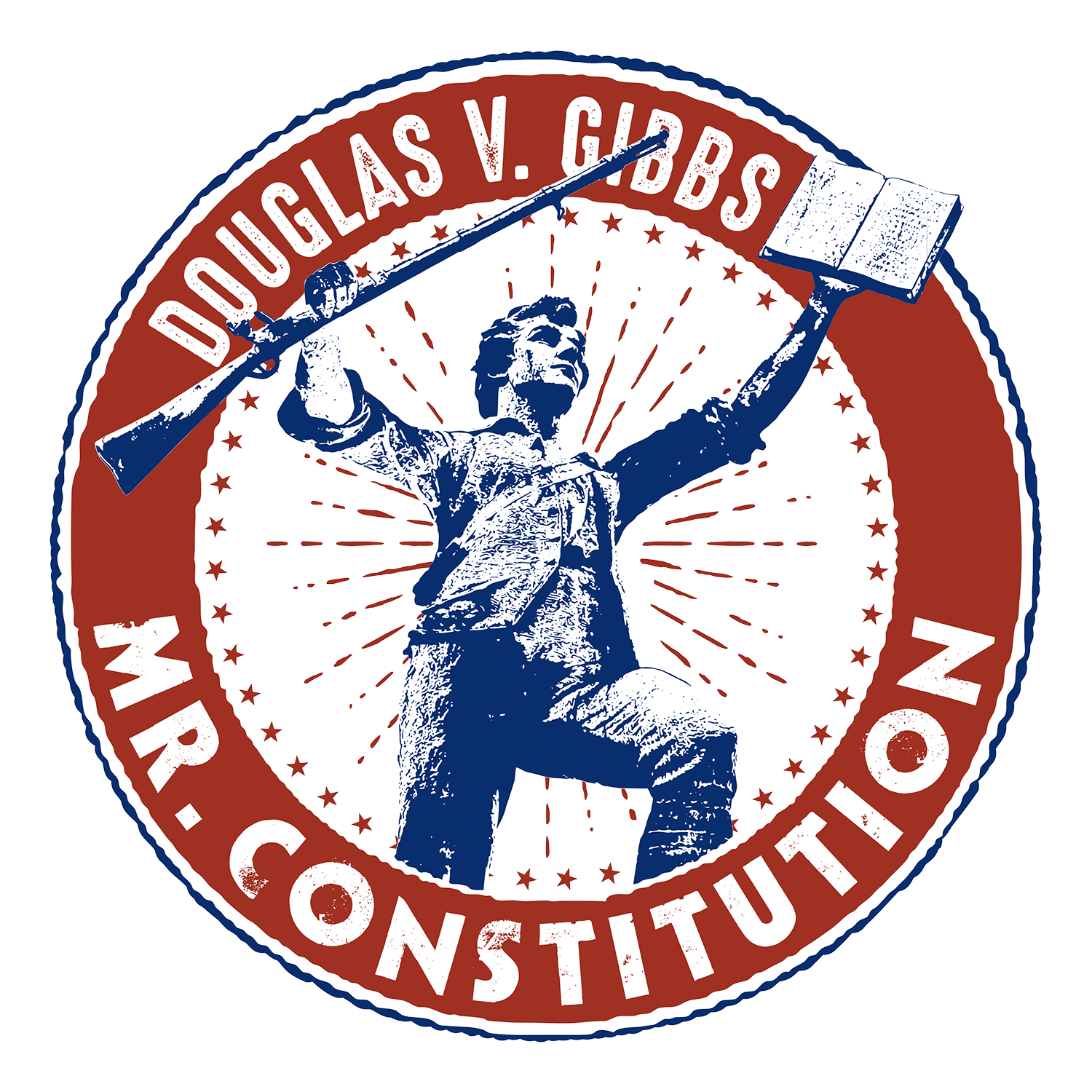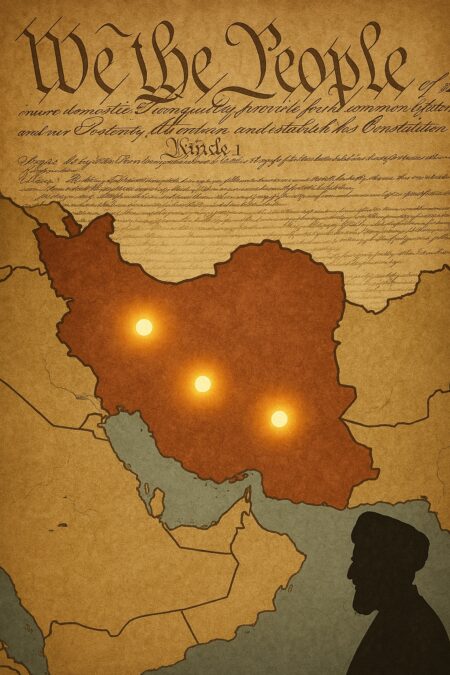By Douglas V. Gibbs
A little over a week ago I wrote an article defending President Trump’s Constitutional Strike against Iran, particularly because Democrats and particular non-Democrat persons were claiming that President Trump’s attack against three nuclear facilities in Iran was unconstitutional because the President did not seek permission from Congress before engaging in the military action. I explained that not only was the action constitutional, it was necessary considering the emergency of the situation. According to intelligence Iran was nearly finished with their work of creating nuclear warheads.
The argument against President Trump’s actions revolves around the clause in Article I, Section 8 that gives Congress the power to declare war. A declaration of war is a formal announcement that a country is in a state of war. It is a bureaucratic and legislative action. But declaring war and waging war are two different things. A war can be declared, but that does not guarantee that military actions will take place – that won’t happen until the Commander in Chief deploys the units that will be used for such an action. A war can be waged, and historically we know for a fact that military actions can be waged, and have been waged, without a declaration of war, but those actions don’t necessarily require a declaration of war to take place. The question is, does the call for a declaration of war mean that a President cannot wage war without congressional approval, and must that approval be in the form of a declaration of war?
As an example to show that a declaration of war is not required to be issued in order for a President to wage war, I used the Barbary Wars in my aforementioned article; undeclared wars engaged by Presidents Thomas Jefferson and James Madison – two individuals I am willing to bet most people will agree had a pretty good handle on what is constitutional, and what is not.
President Trump, when it came to Iran, needed to act quickly, decisively, and surgically. As I explained in the article, if he had to go to Congress first so that they could discuss the action before approving his request to hit Iran’s nuclear facilities, the deliberations would have likely taken months, the plans would have been leaked to the press and to our enemies, and the details would have been telegraphed to Tehran before the first vote was cast. Then, because the President went to Congress to ask for permission to strike these targets first, we’d be counting bodies in the millions as a result of Iran’s imminent hostilities against the United States and Israel.
During the era of the Founding Fathers the whole dependence upon the legislature would have made the situation even worse because Congress would likely not have been in full assembly, so to ask permission to wage war the President would not only have to wait for the bureaucratic wheels to turn, he’d have to wait for representatives that were weeks away by horseback to arrive at the legislature before the whole process could even get started.
Sorry. Military conflict cannot wait for committees to get together. Tyrants in the world who seek to harm us don’t wait for formalities. So, despite what you think about the constitutionality of it all, such a policy would be reckless and dangerous on its face.
A commenter challenged my argument in the article I wrote, claiming I misrepresented Jefferson’s and Madison’s actions because “Jefferson did [communicate with Congress], seeking Congressional guidance, approval, and funding every step of the way!” Then he went into a foray of arguments about how constitutionally Jefferson deferred to Congress in all of his dealings with the Barbary Pirates. Robert Brown (the commenter) also indicated that to “commence hostilities” final authorization and funding belongs to Congress.
When discussing politics I have found it to be a common thing that when someone disagrees with you they tend to argue against things you never said, making assumptions along the way. Based on the commenter’s argument, it seemed to me that he was suggesting I was arguing that the President may wage war at will, that Jefferson and Madison did so without ever communicating with Congress at all, and the as a result I am some sort of “neo-con” (an accusation he levied against me early in his comment) which is another way of saying I approve of endless wars, using war for regime changes, using war to export “democracy,” and that I think the United States and the President in particular must operate as some kind of policeman of the world – all of which I do not agree with. But, not being a neo-con does not mean I must be the opposite extreme as a result. I am a firm believer that sometimes military actions are necessary. Sometimes war is necessary. And when an imminent threat looms over our country or our interests then the President has every authority to take action not because he can initiate war, but because such an action is in truth defensive in nature – he, in these cases, would be defending the country and out interests of imminent threats. Certainly, we can see that the actions taken by President Trump were a proactive defensive mechanism designed to prevent an offensive action by a country like Iran who has shown over and over again that they are not only the world’s largest sponsor of Islamic Terrorism, but they are not ones willing to play by any kind of rules or honor negotiations. The reality is, countries like Iran only understand one thing – a quick punch in the mouth as they prepare to launch war against us.
When one researches the Founding Fathers about war powers, they were more than happy to give us plenty of examples of their opinions. They recognized that a country should not go around chasing foreign entanglements (George Washington in his Farewell Address). In Federalist Paper #69, published in 1788, Alexander Hamilton makes a key distinction between the power to declare war and the power to conduct war, arguing that while the President’s powers are far more limited than those of a British King, the President’s war powers are “executive in nature, dealing with the conduct of war, not its initiation.” He goes on to argue that while the Congress has the power to declare war, it is within the powers of the President regarding how to prosecute war. He then notes that the President’s powers are similar to those of the governors of the States.
So, let’s go to the Constitution regarding the authorities of State Governors regarding war and use that to help us understand the President’s authorities regarding waging war.
Article I, Section 10 indicates that a State may not engage in war, “unless actually invaded, or in imminent Danger as will not admit of delay.”
Okay, so if we take Hamilton at his word in Federalist #69 that the war power of a President is the same as a State’s, and the war power of the State is not to “engage in war, unless actually invaded, or in imminent Danger as will not admit of delay,” then would that not then support President’s Trump’s actions? Iran was on the verge of creating nuclear warheads, they have indicated that they wish to destroy Israel and the United States, the political leadership has led chants “death to the USA;” so would that not then support the thought that if they produced a nuclear warhead it placed America in imminent Danger which would then constitutionally support a President to act as Commander in Chief and wage a military action in order to prevent invasion or the imminent danger of it?
How about a letter from James Madison to Thomas Jefferson dated April 2, 1798 in which Madison offers a foundational perspective on the separation of powers? Madison explains that the power to declare war belongs solely to Congress, and provides that executives in history have a tendency to seek war so the decision to give Congress the power to declare war was a protective measure. But, Madison also explains that it is important for the President to be able to respond to attacks. While a need to guard against tyranny and ensure deliberation before committing to a long war was necessary, defensive military actions belong to the President.
Should President Donald Trump have waited until Iran finished their nuclear warheads and launched them against the United States before taking action, or does “defensive action” include recognizing “imminent danger” or attack as indicated in Article I, Section 10 for the States?
Thomas Jefferson wrote a letter to James Madison on September 6, 1789, addressing a number of constitutional ideas, including war-making. Jefferson also reinforces the concept of a separation of powers between declaring war and waging war, recognizing Congress as the branch that declares war, and the President as the part of government that leads military operations. Like the other Founding Fathers, Jefferson feared concentrated executive power, but recognized that while the country did not want the President to engage in unchecked war-making powers, the President must be able to act militarily when hostilities rise during an emergency exception. While Jefferson also recognized that the President’s job was not to initiate war, his role does indeed include faithfully executing war when needed for the defense of the United States.
James Wilson during the Pennsylvania Ratifying Convention in 1787 did indeed argue that the President’s role as Commander in Chief did not typically activate until a declaration of war was approved by Congress, but he also indicated that the President could act swiftly as Commander in Chief if war was imminent.
The point is, yes the Founding Fathers wanted the President to communicate with Congress when it came to war, and expected war, particularly long drawn out wars, to be declared by Congress before the President engaged in his duties as Commander in Chief. Yes, it is preferable in most situations that Congress and the President work together, with the President seeking congressional guidance, approval, and funding every step of the way. In a perfect world that would always be the model. But, as shown by the above references, the Founding Fathers also understood that the preferred model is not always what is going to be available. It would be suicide when an imminent attack by an enemy is on the horizon and a quick decisive strike is necessary that Congress demand that they be given the plans, that they debate it, that they vote on it, and eventually they give the President a thumbs up long after the decisive strike was necessary. Every Founding Father that the commenter, Robert Brown, references also argues that first seeking permission from Congress is foolhardy when the United States is in imminent danger and the President is required to act quickly. The President must be able to wage war when necessary.
Yes, the Founders were wary of executive overreach. Yes, they vested the power to declare war in Congress. But they understood the practical necessity of swift executive action in emergencies. As Hamilton and Madison made clear – the President’s role as Commander in Chief was not meant to be ornamental – it was designed to ensure America could respond decisively to threats, especially when Congress was not in session, could not convene quickly, or in our case is populated with traitors who have a history of leaking important information to our enemies. Congress may declare war, but deployment of troops or equipment must be left to military leadership under executive direction – and without congressional interference in the case of emergencies and the imminent threat of attack.
The best historical context to support that argument is that during the American Revolution while the States and the Continental Congress tried to micromanage the Revolutionary War we were getting our butts kicked. America lost 8 of the first 11 major battles. But when George Washington was given full control, and was able to exercise his power as Commander in Chief without interference from legislative bodies and bureaucrats who know nothing of war, the course of the war changed in the favor of the Patriots. The Founding Fathers recognized that reality during the Constitutional Convention, and expected the President to have full control over the conduct of war once authorized, or when strategic and rapid response was needed without congressional approval due to the emergency nature of the situation. Congress held all of the war powers under the Articles of Confederation, and the Founding Fathers realized that was a mistake; so the Founders in the Constitutional Convention sought to balance deliberative war-making with executive agility. Congress may declare war, but the President has been empowered to wage it – especially in emergencies – because the realities of governance sometimes demands swift, centralized military leadership.
Balance. The Constitution was all about a proper distribution of powers, and requiring a President to receive a legislative body’s approval before taking any war power actions is suicidal, and totally against what was intended.
President Donald Trump acted in a constitutional manner when he hit Iran’s bases – and contrary to the mainstream media’s false reporting, he was indeed in contact with Congress, and advising them as reports came in.
As for the question over whether or not the action was called for from an “emergency” point of view, I don’t think there are many greater emergencies that ought to enable the President to act swiftly and decisively than Iran obtaining a nuclear weapon. President Trump’s actions not only saved Israel, the Middle East, and likely the U.S. from a nuclear strike from Iran, he saved the world from an evil that has been lurking in the dark and seeking the destruction of The West since even before the Barbary Wars were waged without a declaration from Congress by Presidents Jefferson and Madison.
— Political Pistachio Conservative News and Commentary



